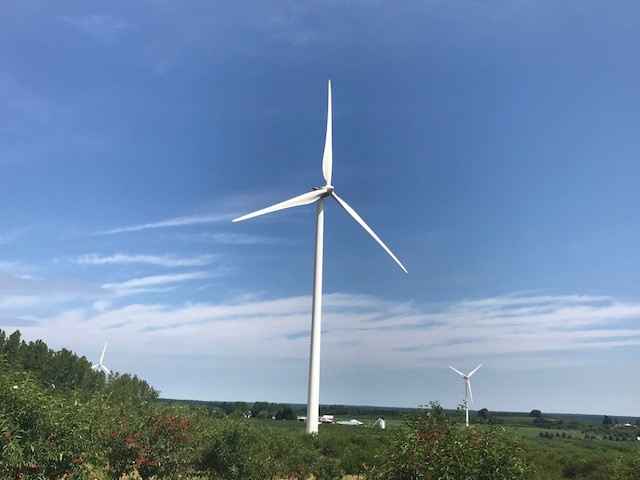Half of Amway’s Ada Complex, including the World Headquarters is powered by green energy harvested from towering windmills.
Amway was among the first companies in Michigan, USA to invest in wind power for its energy needs, and its commitment to this renewable resource is expected to grow, said the company’s Sustainability Program Manager Eric Van Dellen.
“If you looked at our GHG (greenhouse gas emissions) profile, by far the largest factor is electricity use. So, if you want to impact that emission profile, you’ve got to reduce it,” Van Dellen said.
Determined to shrink its carbon footprint, Amway began purchasing wind power in 2008. The opportunity came after the state Legislature allowed 10 percent of Michigan’s electric customers to buy power from independent suppliers instead of longtime regional utilities.
Buying on the open market provided access to less-expensive electricity. Amway used the savings to invest in wind power, which at the time was more expensive than coal-fueled electricity.
The company chose this option because coal comes with a higher environmental cost. This fossil fuel contributes to global warming by increasing the levels of carbon dioxide, or CO2, and other gasses that trap heat in the atmosphere.
Amway’s leadership saw this green power as the future.
“We knew wind power would evolve and grow, and we wanted to be part of it and support it,” said Van Dellen, who has worked for the company for nearly four decades.
In the first eight years, the company shrank its carbon footprint in West Michigan by 25 percent by buying wind energy, which has zero emissions.
The initial wind power came from Harvest Wind Farm, the state’s first commercial-scale wind project. Located in the Mitten State’s thumb region, this 3,200-acre expanse of giant whirling blades was launched by farmers with funding from Illinois-based tractor company John Deere.
It is distributed to Amway and other companies through Wolverine Power, an energy cooperative that invests in solar, wind, and hydro energy assets.
The investment in sustainability has been good for the environment and the company’s bottom line.
“We still save money and are able to invest in more wind power because more is coming online and getting much cheaper,” Van Dellen said.
As a privately owned company, Amway is able and willing to take a long-term approach to investments like green energy.
“They’re much more long-term thinkers,” Van Dellen said, when talking about the company’s leaders.
Wind power was chosen over solar energy because the Midwestern state’s climate is better suited to wind than solar energy.
“We view the environment as things we shouldn’t waste,” Van Dellen said. “We think it’s good for business. We don’t want to waste things, and we certainly don’t want to waste the environment or environmental resources.”

